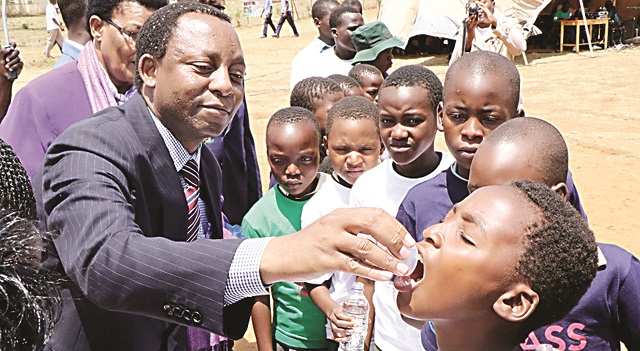Massive resistance to mass drug programme


Ministry of Health and Child Care officials administer drugs to pupils to launch the National Mass Drug Administration at Nyamandlovu Hospital recently. (Picture by Eliah Saushoma)
Whinsley Masara, Chronicle Reporter
THERE has been apathy in Bulawayo following the start of the national mass drug administration programme last Monday as some parents are not keen on allowing their children to get medicines.
The Bulawayo City Council said the programme was supposed to end last Saturday, but was extended to today due to apathy.
Bulawayo City Council senior public relations officer, Mrs Nesisa Mpofu, said some teenagers were also discouraging each other from participating in the programme that is targeting both children and adults as part of efforts to fight neglected tropical diseases in the country.
There is also Vitamin A Supplement being given to children aged between six and 59 months.
“Challenges are being faced here and there. Some of the care givers are not keen on consenting to their children getting the medicines. Teenagers are also influencing each other to refuse to take medicines and the uptake of the programme has been low in clinics. The service providers are also overwhelmed hence long waiting times are being experienced, especially in schools. Coverage is currently below 30 percent in all medicines,” she said.
“The programme will continue up to November 4 as planned with the exception of some private schools where special arrangements have been made for November 6 and 7, 2017. The national mass drug administration is being conducted in schools, crèches, shopping centres and all municipal clinics.”
Mrs Mpofu said the city council continues to urge people to participate in the programme after a study showed that 15 percent of residents in the city, especially school going children, were at risk of contracting bilharzia, elephantiasis and soil transmitted helminthiasis, among others.
She said some members of the community have reported positive results on the medicines administered.
“For example, one care giver brought a child to the clinic and witnessed that the child had passed a stool that had worms after receiving Albendazole,” Mrs Mpofu said.
Health officials dispelled claims that medication from these diseases has serious side effects which are dangerous to humans. Last year the country conducted a one week immunisation programme against measles and rubella in children.
@winnie_masara








Comments